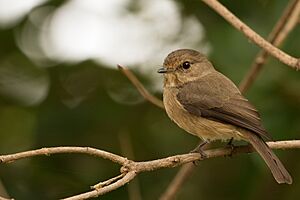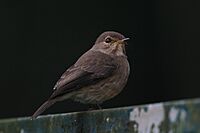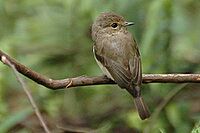African dusky flycatcher facts for kids
Quick facts for kids African dusky flycatcher |
|
|---|---|
 |
|
| Lake Naivasha, Kenya | |
| Conservation status | |
| Scientific classification | |
| Genus: |
Muscicapa
|
| Species: |
adusta
|
The African dusky flycatcher (Muscicapa adusta) is a small, brown bird that lives in Africa. It's also sometimes called the dusky-brown flycatcher. This bird belongs to a group called Old World flycatchers, which are known for catching insects while flying. You can find these birds in many parts of Africa, from Nigeria all the way down to South Africa. They love living in woodlands, especially near water like lakes and streams, and even in gardens with lots of trees.
Contents
What Does the African Dusky Flycatcher Look Like?
The African dusky flycatcher is about 13 cm (5.1 in) long, which is roughly the length of a pen. It weighs around 11 g (0.39 oz), which is about the weight of two quarters. Its top side is a plain brown color. The only mark on its face is a faint ring around its eye. Its chin is a light grey, and the rest of its underside is grey-brown with soft streaks.
Features of the African Dusky Flycatcher
The bird has a short, straight, black beak that looks a bit flat from the sides. Its legs and feet are grey, and its eyes are brown. Male and female African dusky flycatchers look very similar. Young birds, called juveniles, have buff-colored spots on their backs and whitish spots with brown on their undersides.
How to Tell it Apart from Other Birds
This bird looks a lot like another common migrant bird, the spotted flycatcher (Muscicapa striata). However, the African dusky flycatcher is smaller and darker, especially on its belly. The spotted flycatcher also has streaks on its forehead, which the African dusky flycatcher does not have.
What Sounds Does it Make?
The African dusky flycatcher makes soft, high-pitched calls. These calls sound like "tzeeet" and tsirit.
-
A young African dusky flycatcher, seen in Bwindi Impenetrable Forest, Uganda
How Does the African Dusky Flycatcher Behave?
The African dusky flycatcher builds a nest that looks like a cup. It usually places its nest inside a hole in a tree, a few meters above the ground. The female bird lays two or three green eggs. These birds often reuse the same tree hole for their nest in the next breeding season. African dusky flycatchers are monogamous, which means they mate with one partner for their whole lives.
How They Find Food
You will usually see African dusky flycatchers alone or in pairs. They like to sit on an open branch and watch for insects. When they spot an insect, they fly out quickly to catch it in mid-air, then return to their perch.
Is the African Dusky Flycatcher Endangered?
The African dusky flycatcher is a common species and lives in a very large area. This area is estimated to be about 2,300,000 square kilometers. Scientists believe there are many of these birds, and their numbers are not decreasing quickly. Because of this, the species is listed as "Least Concern" by the IUCN Red List. This means they are not considered to be at risk of becoming endangered.




